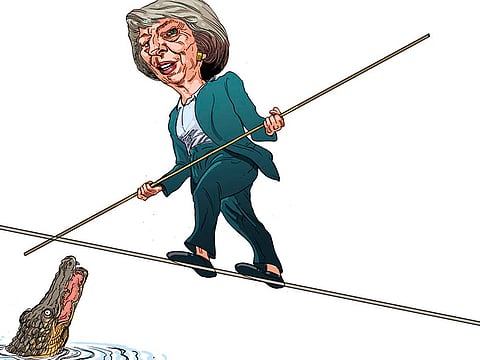A large majority will allow May to ignore Conservative rebels
British PM will be in a position to make the necessary compromises with the European Union in Brexit negotiations

UK Prime Minister Theresa May’s snap election in the UK should give her a large majority of over 100 to 120 seats compared to her present very small working majority of 12 seats. Such a gain will allow her to face down any future hard-core pro-Brexit Conservative rebels who might turn against her after she makes inevitable compromises as the talks with the European Union (EU) progress.
The biggest electoral shift is likely to be Conservative gains from a totally unprepared Labour, even if the Liberal Democrats manage to regain a few seats. The Conservatives may even pick up a few seats in Scotland where the Scottish Nationalists have stayed around their 50 per cent approval rating although drifting lower, but the Conservatives have recovered from their 15 per cent low in May 2015 to a much more positive 27 per cent which is still going up.
A large part of May’s reasoning is that she will be anxious to avoid the same slow destruction that the anti-European Conservative MPs dished out to their own Prime Minister John Major during the long Maastricht debates.
He won the 1992 election with a small majority of 21 seats that was eroded by a string of by-election defeats and the defection of one MP to Labour, so by 1997 the Conservatives did not have a formal majority. But anyway Major had lost his effective majority to the anti-European Conservative rebels. For example, during the second reading of the Maastricht bill there were 22 rebels when the government had a majority of 18.
Conservative hatred
The same passionate hatred of Europe remains a significant part of the hard Brexit fringe in the Conservative Party and it is all too likely that they will pounce on the compromises that May’s team will certainly have to make before the 2019 deadline. The negotiations with Europe will be two-way negotiations, and will involve Britain accepting some aspects of the European Union’s ideas, just as the EU will have to deal with some of Britain’s requirements.
May’s political problem in Westminster is that the requirement to make deals has not been part of her pitch to the Conservatives as she has foolishly wrapped herself in nationalist rhetoric and spoke wildly of “a red, white and blue Brexit.”
So compromises over immigration of certain categories of people, or acceptance of the European courts in certain defined jurisdictions, may well cause the 10 to 30 hard-core anti-European MPs to revolt and seek what they might call a naked Brexit, putting their prejudices above both party and national interest. But with a majority of more than 100, May can afford to ignore the rebels and go ahead anyway, confident of winning the necessary votes in the Commons.
Unusually, parliament has to vote on this election because it involves over-turning David Cameron’s Fixed Term Parliament Act of 2011 that was put together as part of guaranteeing stable government as the Conservatives built a collation with the Liberal Democrats in the middle of the financial crisis. This is why the election requires a two-thirds majority in the Commons and it will be interesting to see where May gets the extra numbers that she needs to make this election happen.
Fighting talk
However, none of this was mentioned on Tuesday when May came out already fighting an election for which the other parties were not prepared. May did not mention any desire to be find the room to manoeuvre over Brexit in her statement announcing the surprise election. Instead she stuck to her pro-hard Brexit line and said there was no turning back from Britain leaving the EU, and used her statement to make a staggeringly exaggerated attack on the opposition parties for trying to wreck Brexit.
“The country is coming together, but Westminster is not. In recent weeks Labour has threatened to vote against the deal we reach with the European Union. The Liberal Democrats have said they want to grind the business of government to a standstill. The Scottish National Party say they will vote against the legislation that formally repeals Britain’s membership of the European Union. And unelected members of the House of Lords have vowed to fight us every step of the way.”
This is a wildly inaccurate account of the confused and inadequate opposition that the Conservatives have actually faced, but even if it was factual nonsense it made a good electoral speech and showed May to be a much more complete politician than she may have appeared.
May took the opportunity to make it seem that her general election is about destroying a coordinated resistance to her plans for Brexit when in fact Labour has offered a totally muddled critique that has got nowhere, and the Scottish Nationalist have got sidetracked into focusing on getting second referendum and have failed to offer any substantial opposition to the government’s plans.
The Liberal Democrats have been consistent in saying from the start that Brexit as a mistake and they oppose it, but their eight members of parliament are not enough to make any difference to anything.


